From the Alaska Highway News (Fort St. John) – June 8, 2011
by Ryan Lux
Applications have been submitted by two
energy companies to the Ministry of Forests, Land and Natural Resource
Operations, to pipe water out of the Williston Reservoir for use in
fraccing operations on the Montney shale gas play.
According to the OGC, Talisman Energy
and Canbriam are both seeking to withdraw 10,000 cubic metres of water
per day – 7,300,000 cubic meters per year in total – to provide water to
their various drilling sites through a network of pipelines.
Up to this point, both energy companies
have been depending on short-term water use permits, which allow
industry to draw water from surface sources and shallow wells. One
surface source, which has generated tension, is the Lynx Creek boat
launch where Talisman has been withdrawing 4,000 cubic meters per day.
The tension created by trucking water
out of the popular recreation spot will be eliminated, according to
Talisman spokesperson, Phoebe Buckland, if the company receives approval
to pipe the water from the Williston Reservoir.
“We’ve been using temporary permits
over the last couple of years through the OGC and now we’ve applied for
two permanent licenses for the Williston Reservoir, one to withdraw the
water and the other to construct a pipeline,” said Buckland.
“After reviewing our options we feel
that the this is the best solution, as the Williston Reservoir provides a
reliable source of water and the pipeline would reduce tanker traffic –
reducing the impact on residents and our greenhouse gas emissions at
the same time.”
If approved, the water would come from
the reservoir south of Hudson’s Hope and run to Talisman’s Beryl Prairie
Road facility, where it would be stored in pits and tanks until used
for fraccing operations.
Talisman plans to withdraw 3.6 million
cubic meters a year, a figure which Talisman claims represents only 0.01
per cent of the average yearly flow through the W.A.C. Bennett Dam.
Despite the fact that their proposed
water withdrawal only represents a fraction of the river’s flow,
Buckland explained her company plans to recycle almost all of the water
they use.
“Water management is something we take
very seriously and we are aware that fraccing requires large volumes of
water,” acknowledged Buckland, “We’re recycling close to 100 per cent of
the water to be used in future fracs.”
Buckland explained that following a frac, the water returns to the surface where Talisman captures it for re-use.
Even with assurances of solid water management, critics have raised concerns about Talisman’s proposal.
Sustained drought has placed a strain
on water levels in Williston Reservoir, which was four metres below
average in September 2010, a situation that forced BC Hydro to import
$200 million of electricity last year.
Ben Parfitt, of the Canadian Centre for
Policy Alternatives, explained what concerns him about the permanent
water licensing proposals is the prospect of locking public water
supplies into private companies for what could be decades.
Chief Roland Willson expressed concerns
over the consultation process: “As far as I’m concerned, the Oil and
Gas Commission should not be leading any consultation on water rights or
allocations in our territory,” Willson said. “That’s a job for
provincial water regulators. The other thing that really concerns me is
that when they finally send us information they neglect to mention that
Talisman is not alone in seeking to divert massive amounts of water out
of Williston Reservoir.
“In fact, there is at least one other
major water diversion proposal that has been filed with the provincial
government. If they want to present us with the ‘bigger picture’ they
need to give us all the information, not half of it.”
BC Hydro didn’t return calls by press
time to discuss whether or not the Crown Corporation would receive
compensation for the diverted water, which otherwise would be used to
produce electricity. At present, energy companies don’t pay for the
water they draw from surface sources and shallow wells.
Buckland said Talisman is confident
their proposal will meet provincial requirements and that the process
has engaged the public through consultation and awareness campaigns. To
date, Buckland couldn’t recall any water applications submitted by
Talisman that haven’t been approved.
Construction on the pipeline could
proceed as soon as this summer and be completed within several months,
pending regulatory approval.
Read original article






